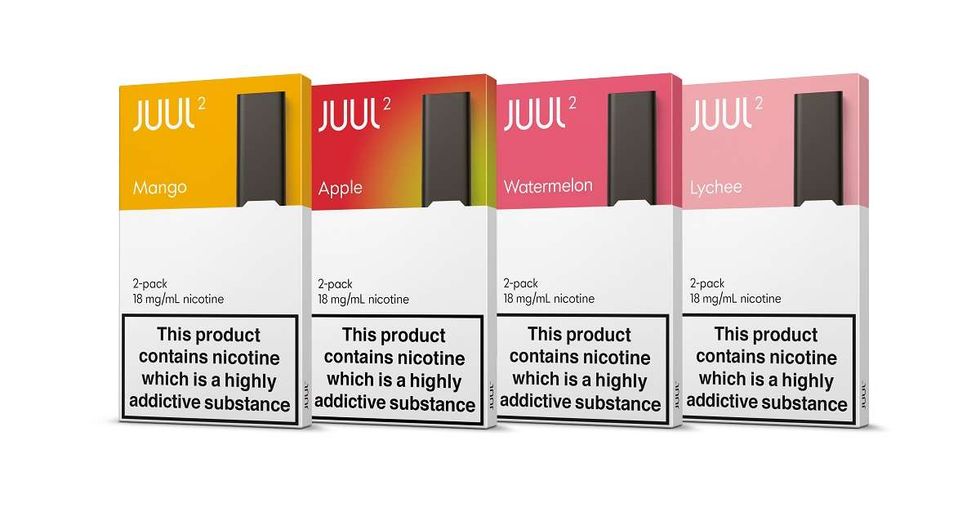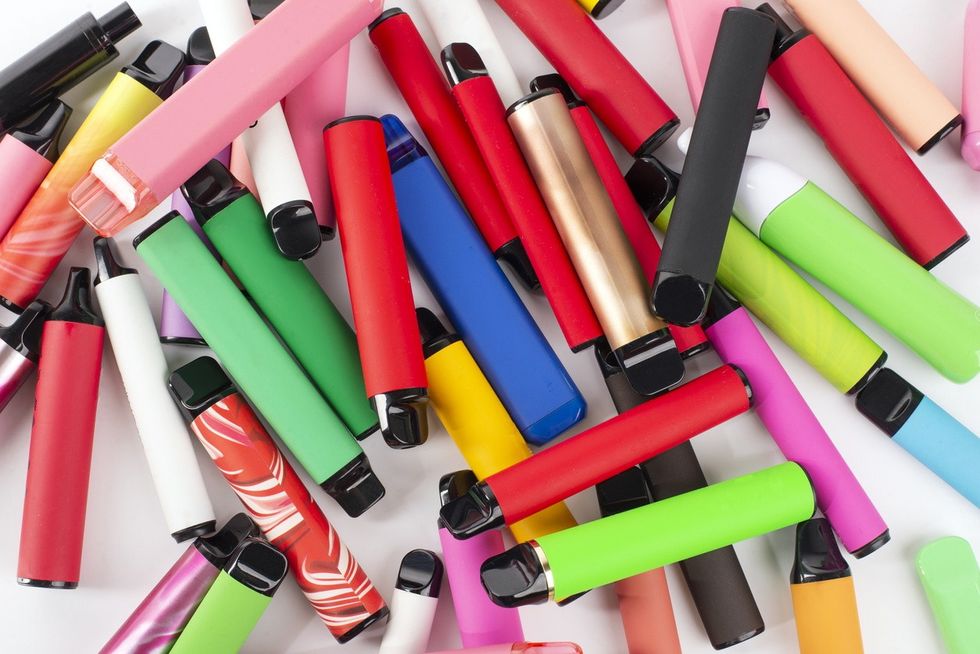The last time Asian Trader visited the UK headquarters of Juul Labs it was in a building tucked away in Stukeley Street, just behind Drury Lane. That must be – shocking how time flies – over three years ago. Not long after that, JUUL seemed to go a bit quiet: there were problems in the USA, although none of the controversy attached itself to the UK operation. Nevertheless, we didn’t hear anything from Juul Labs for a while.
But now, Juul is back, big-time. The office has moved, and displaying a sense of seriousness and purpose, has relocated to the City and into a bigger, brighter and airier space that is a fitting backdrop for its fresh new offering of JUUL2 – a new incarnation of which intends to lift the pod market above the free-for-all vape fray and establish a new standard of taste and adult sophistication.
Something has been cooking for a while, but with the official launch of the redesigned and refreshed JUUL2 range, with advanced tech and new flavours, it is time to find out about it – also to meet Juul Labs' new MD, Melissa Wisdom.
Melissa arrived at Juul Labs late last year from pub estate Stonegate Group, where she had been CCO, and before that, the commercial director at Diageo, among a spread of other places. Quite a catch for Juul Labs, Melissa had originally wanted to be a lawyer, but the idea palled.
“I read law at Cambridge, then decided that that was – I won't say boring, because we shouldn't use that word – but I think I watched too much Ali McBeal or Suits,” she laughs. “Then I went into the world of commercial, and I've spent time in every channel and lots of different categories, which I think really helps you connect the dots. I've done grocery, discount, e commerce, wholesale, convenience. I've done supplier side. I've done customer side in the on-trade at Stonegate.”
Melissa points out that in hindsight she has already worked in many regulated industries – infant formula, alcohol, over-the-counter medicines – which have proved to be good preparation for Juul Labs and the vape sector.
“I think I've always tried to get breadth, because I think that then really helps you think three dimensionally about problems, helps empathize with people ... And I've always had a thirst for learning. I quite like different; I quite like multifaceted.”
This is just as well, because next gen nicotine is hardly a quiet sector. It’s a lively and growing market with tons of potential and at heart a fine public health message about quitting tobacco for something much less harmful. But it faces headwinds from negative lobbying and media stories, government legislation, and a massive illegal trade.
JUUL2 was first revealed in April 2022, but it’s fair to say that the current version, as we will learn, is a massive leap forward and represents a new direction for the brand.
The Big Switch
Having a legally trained intellect is no bad thing in the cockpit of current debate over the tobacco and vapes, but it’s not all you need. When I ask Melissa about her motivation to join the sector, she replies, “I think it’s a combination of the whole category being fascinating, that whole regulated dynamic. And there's a personal kind of passion point on the mission ... I grew up with a single mother, and she smoked. I vividly remember when I was four or five years old, begging her every day, saying, ‘Mummy, when you smoke and you get poorly or you die, I don't have a daddy, and I'll be an orphan’.”
Juul Labs benefits from having been thrown into the furnace of controversy in the past, and I think looks as if it has emerged tempered and with a sharper, more sophisticated edge, which is just as well as it launches into the Wild West of vape – with illicit and unregulated products and points of sale running rampant alongside the responsible and mostly corporate offerings.
“We are launching a curated, small range of fruit flavours,” says Melissa. “You can see we're doing it in relatively plain packaging versus what you'd see in what you call the Wild West and I call the free-for-all market today.”

Is it a conscious strategy to keep the design and the flavours clean and calm and mature as a counterpoint to the rainbow chaos that harms the reputation of the sector?
"You can see that the new JUUL2 additions are named as single fruit flavours. We are trying to strike the balance of how we can have sufficient appeal to adult smokers – because we know the category has to be sufficiently appealing to people to make that switch – without appealing to youth or non-nicotine users."
Switching is important for Juul, and they make a lot of their switching stats – how many smokers they are pulling away from the weed and onto the liquid.
“If you go to the original mission of the company, which I guess hasn't changed and goes all the way back to the founders, it's independent, with a clear mission to help adult smokers transition – hence the passion point – and combat underage use. That's a very clear single focus.”
There is indeed a singular aim branded into Juul Labs’ products. They have JUUL2 and that’s all – a streamlined offer, a boutique, refined style and simple, classic flavours – instantly recognisable lines.
"Yes, you're right,” she says, “JUUL2 is the portfolio and it's our most advanced device on the market.”
Technology with style – the Apple of vape, then? I am just trying to relocate the brand in the field alongside its competitors after the hiatus. But it feels right to think of JUUL2 like this, even though it’s just as available and value-driven as others.
“Currently, we sell a pretty focussed portfolio of tobacco and menthol products, and we do very well in the segments that we trade in,” Melissa continues. “Obviously, we trade in small segments today because tobacco and menthol are smaller segments in the market than fruit flavours.”
But the new fruit flavours – Mango, Apple Watermelon and Lychee – are now with us, and they are ambitious, fresh-tasting items in the cupboard of the Big Switch to attract more adult smokers and put off the teeny-vapers.
“We think that those naming conventions of single fruit flavours and plainer packaging do that,” Melissa nods. “It's widely accepted, with lots of different scientific and behavioural evidence, that fruit flavours have a clear role to play for adult smokers to make the switch. We know that from our own customers, and we see it a lot in research and literature.
“We've taken our time with it. We've spent a lot of time with R and D and it is all singular fruit, the flesh of the fruit. I was sat on a consumer panel and someone said, ‘Oh, I really feel like I've just taken a bite of watermelon’.” Melissa beams with pride.
“We've got highly competitive quit rates,” she reiterates. “But for me, it's about how we really focus on the tech that's in the product. We've got the best nicotine delivery. We worked really hard at that. We then partner that with the right e-liquids. And back to that responsible position we take in the marketplace: our tech also has some really cool stuff, like age verification, so you can unlock it with a single tap if you're an age-verified user, and it's linked to Bluetooth. There's an app which is available on Android, and you can click through and get to it on an iPhone, which allows users to really look at their puff count and their usage. We also have a unique ID chip in the pod that will only work in the device.”
So, security and responsibility built in – is facial recognition or fingerprint release next?
“There's a ton of tech that's in the device,” Melissa continues, “both in terms of the delivery and the effectiveness it gives to the user, hence the successful quit rates.”
And they are green, too, having established a firm relationship with a company called TerraCycle for recycling Juul Labs products.
“It’s part of our overall positioning of how we're a responsible company. Our device has a two-year warranty, so that tells you how non-disposable it is. And then you can order a bag online, you can send your pods off entirely for free in the free post, and they're recycled!”
The team is rightly proud of the redesign, the sleek packaging, the fresh flavours and the new launch. But then they will be in the fray, having to confront the corrosive effects of illicit product that seem now to be everywhere.
A free-for-all
“Our vision for vapour is for it to be a category that is regulated in a robust way, appeals to adult smokers, and helps us accelerate the switching mission and the public health mandate of getting people to stop smoking.,” Melissa says.
That’s what the government also claims to want, yet instead seems set on hampering the progress of vape with its lack of understanding, it’s blunt ignorance of second-order consequences.
In tobacco, the endless taxes have now driven even the most law-abiding smoker to consider buying cheaper smuggled product, while plain packaging and various bans have simply driven the problems of smoking underground, where they spread more quickly beyond the reach of regulation. Less revenue, more crime – much more crime: the opposite of what government intended.
Could such clumsiness now be threatening the vape sector, too? I mention that there is talk in Westminster of enforcing plain packaging on vape products, in addition to throttling the flavour range. In France last month, the Paris bigwigs unilaterally decided to ban nicotine pouches, without warning or consultation. There seems to be endless propaganda demonising vape, even though, as Public Health England never stopped saying, it’s at least 95 per cent less harmful than smoking.
“I would start by saying that one of the stats that keeps me awake at night the most in this job, is over 50 per cent of smokers have a misconception that vaping is at least, if not more harmful to them, than smoking,” says Melissa.
“You can completely see that underage use and the illicit market, which is a problem in the UK – not for Juul, but it's a problem in the marketplace – drive outcomes around how we solve those problems. At Juul, we are broadly super supportive of any initiative that helps tackle youth use or the illicit market. But there's a balance that we have to strike.”

Has the elegant re-design of the new JUUL2 wrapping been a tactic to front-run any oncoming regulation?
“There is clearly a place for asking what packaging should look like,” she answers. “What naming conventions should look like. As I say, we try to lead the category by saying, ‘Do you know what? We've got plainer packaging. It's clear. It's got clear descriptors. It's appealing enough, but it is absolutely not appealing to youth use’. And we do a ton of stuff to make sure that that is not the case. So that could be working with retailers to enforce Challenge 25 – we've got a very comprehensive underage prevention programme where we do things like mystery shop, we work with retailers on results.”
What about industry-wide measures, perhaps a licencing regime to throttle illegal supply at point of sale?
“On the face of it, we would be very supportive of that program. We all agree about the need to combat illicit,” Melissa answers, “and that a free-for-all Wild West is not in the interest of public health or our children. That said, the vast majority of retailers are responsible retailers, so this is nothing to fear. But again, it's getting that balance right. We can't make the category a barrier to access for adult smokers. We need to make sure it's an effective revenue stream and operable for our convenience partners who we need dearly in our supply chains.
Well-disposed?
Melissa’s thinking about how to stop products at the point of manufacture reveals a brilliant turn of lawyer-like analysis.
“If you or I refresh the MHRA [Medicines and Healthcare products Regulatory Agency] webpage,” she explains, “we might see 900 things authorized this week, and some of those things would have everything we've described as bad: a bright pink Game Boy screen for a product called FizzyKola or something.
“I think there should be a robust set of standards that is evidence-based, based in science, demanding, ‘Is this a product that will help an adult smoker switch from cigarettes to a vape? Does it have the right level of nicotine delivery? You and I could name a list of what that criteria could be. Is it marketed responsibly? What is it called? What does the packaging look like?”
Making it harder for the cowboys to get away with supplying inappropriate and socially dangerous items would be a good way to clean up the market.
“It's very easy to start thinking about all the things that might need to be done in a game of whack-a-mole. But it's much easier and logical to start with defining these products. How do they enter the marketplace? How are they marketed? I would start there.
“I don't really want to use the word ‘barrier’,” she says, “but thinking about the standard or the threshold required to enter the category, what a great way to do it!”
The Big Thing the government imposed this year, in an attempt to get its intellectual milk teeth into the problems surrounding vape (including the pollution issue), was of course the ban on disposables.

Melissa’s criticism of that measure is both nuanced and perceptive.
“The disposable ban has got an excellent sentiment and is clearly trying to tackle youth use, and there is a huge point on the environment in there, too. But the practical reality that I see on the ground or see in the data every day, is that the category has adapted,” she says.
"You now have products that consumers continue to treat as disposables, and we could debate why that is. They look very similar. They've got the same brand name; they're the same price. As for the dexterity of how I can actually use that as a reusable device, for example, and how easy is it to physically remove the pod while not breaking a nail – question mark. Or, can I find the pods on the shelf that match that device or are there supply chain problems – question mark.
“When you step back and look at industry data, as I do every week, and ask what is the pod-to-device-ratio of a device, I see that it's not very different from when it was a disposable.”
That revelation demands a “Wow” at least – it's the antidote to industry figures getting callouses from slapping themselves on the back about how the sector has cleansed itself of sin.
“I think there are still products for sale that are not in the spirit of the law, should I say, even though they might be to the letter of the law. But I am encouraged by what the government might do next. The Tobacco and Vapes bill gives a clear set of powers – but they will only be useful if they're brought to bear and used on a dynamic basis. So, let's watch this space and see what happens.
Favourite channel
Towards the end of the interview, I sneak in a question about how Juul Labs regards the convenience channel. I suspect some execs of favouring their mega accounts with the multiples while giving lip-service to indie retailers – so how does Melissa see the channel?
"I’ve sold into every channel," she says. “I've worked every channel, and in the alcohol industry, where wholesale into convenience is huge. It's also a hugely important sector for vapes. You can never get there without the convenience channel.”
Agreement!
“Now that we've got this small, perfectly formed flavour launch, I think we've become much more relevant in that channel. Convenience is a big part of the life of the High Street. I come from the pub sector and it's not that dissimilar. But I think one of the coolest things is that it's largely business owners in their own communities.
“How amazing is it that you can have adult smokers in your neighbourhood who will come to you and say, ‘What do you think? Which one should I buy?’
“I also think that for the convenience sector, Juul is a very interesting proposition, and there's three things I'd say. One, we have the loyalist consumer, so if they can't find JUUL2 they are very unlikely to substitute. They're very likely to go and find it. Second, they buy more frequently because of our pod size. We are not a big puff and that is helpful for footfall because they haven't bought a big puff once a week. Three, we also know that they've got some of the highest basket spend, so they're very likely to cross-shop other things, perhaps an energy drink or a bacon sandwich, depending on what your offering is in your store.”
“As we become more relevant and grow in the marketplace, we will be doing more activities – POS kits, promotions, trade and education programs. We've got national reach across the wholesale network, and we're working with a few selected partners on deeper plans, in-depot days and so on. We're going nationwide.”
So, in other words ...
“We're back!”


